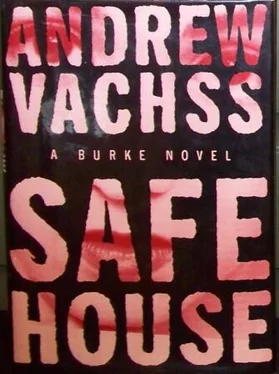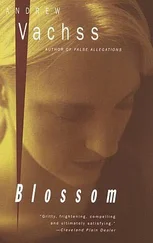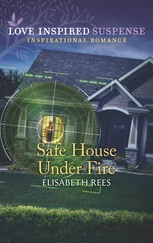We turned left at the end of the block. “What was that all about?” she asked me.
“I needed my hands free,” I told her.
“For what?”
“For whatever. If those guys got stupid, I’m holding your hand, I might as well have been wearing handcuffs.”
“They didn’t do anything.”
“I’m not a fucking fortune-teller,” I said.
“Are you always this suspicious?”
“Yeah. Are you always this not?”
“I wasn’t raised to be paranoid,” she said, looking at me for the first time.
“Where I was raised, it was the best way to be.”
“Where . . . ?”
“Inside,” I said. “Surrounded. You understand?”
“I . . . don’t know.”
“You want to give me your hand again?”
“Why? Did you like it?”
“Yeah. I did.”
She was quiet a minute, walking next to me now, stride for stride. “Me too,” she finally said. And put her hand back in mine.
She led me into an alley just barely wide enough for a garbage truck. Didn’t look like one had tried that for quite a while. She turned right, stopping before a chain-link fence secured by a rubber-covered padlock that spanned a narrow opening in the alley wall. A metal sign wired to the gate said: BEWARE OF THE . . . The rest of the sign was a jagged edge from where it had been ripped apart.
Inside the chain-link, a back door was positioned between a pair of windows covered with thick wire mesh. The door itself was encased behind a security gate, a heavy lock anchoring it to a steel frame. She took her hand from mine, pulled a Medeco key from her coat pocket and turned the lock. The security door pulled out. Behind it was another, this one painted a light blue. Crystal Beth used the same key on another lock, and we were inside.
“Come on,” she said, starting up a flight of metal stairs.
The staircase was almost pitch-dark, the dim light flowing from somewhere above us too faint to do anything but cast murky shadows. Crystal Beth climbed as confidently as a Sherpa. I followed a couple of steps behind her, not questioning. Only myself for going along with this.
At the landing, she turned and walked toward what had to be the front of the building. We passed a few doors—all closed. At the end of the corridor was a pair of blacked-out windows. The floor looked deserted. Crystal Beth walked past the windows without a glance and started up the next flight, still not saying a word. I went along, following.
On the next floor a pair of long fluorescent tubes cast a yellowish light down from the ceiling. One door stood halfway open. Crystal Beth stepped through it. Over her shoulder I saw a whole wall of exposed brick and a tall woman with a clipboard in one hand. The woman looked past Crystal Beth to where I was standing, said, “Who the fuck is this?” in a voice as warm as a microchip.
“He’s helping me with something,” Crystal Beth told her, not moving.
“No outsiders,” the woman said, holding the clipboard like it was a cross and I was a vampire. A chocolate-colored cat stuck its narrow head around the corner of her room, regarding me with that “What’s-in-it-for-me?” stare they all have.
“Stop making rules, Lorraine,” Crystal Beth told her. “We’re going to my place. I just wanted you to know we were in the building.”
“I—”
“Come on,” Crystal Beth told me again, turning on her heel and walking away. I followed her again, not looking back, feeling the tall woman’s glare on my back like a laser-dot from a sniper’s rifle.
We walked quickly past the next floor. All closed doors, but I could hear music playing behind one of them.
“This is mine,” Crystal Beth said when we finally reached what I guessed was the top floor. She opened a door and walked in.
As soon as I saw the skylight overhead, I knew I’d been right about it being the top floor. The room was spartan—a mattress on the floor with neatly tucked blankets on top, an ancient leather easy chair patched with multi-colored scraps sitting under an old-fashioned floor lamp with a parchment shade; next to it, an empty orange crate held a large handmade clay ashtray and a box of kitchen matches. A wood desk was against the far wall, bracketed by some army-surplus filing cabinets. The only modern furnishings were a laptop computer with a row of wire-connected peripherals and a radio–CD–cassette–tape combo with bookend speakers sitting proudly on bookshelves made from long planks set on cinderblocks. I glimpsed what might be a kitchen to my left. Closed door to my right was probably a bathroom. The other door was a closet, maybe? Thick-cored gray radiators sat between the windows and against a side wall. The windows were heavy-coated with the same blackout paint they had downstairs.On the sill next to one of them was a green Micata cordless electric drill, a long narrow bit already fitted.
“You into carpentry?” I asked her.
“I’m into self-defense,” she said firmly, picking up the drill and pulling the trigger. The bit whirred. Up close, it would make a knife look friendly.
Crystal Beth replaced the drill—crossed over to the easy chair, flicked on the floor lamp. It glowed faintly yellow through the parchment shade. “Give me your jacket,” she said. Hers was already off, folded over her arm.
She opened one of the closed doors. Hung up our coats on a single hanger, mine over hers. Said “Have a seat,” pointing to the easy chair.
Then she took a beige metal chair from where it had been lying folded against the wall, unsnapped it and put it next to the easy chair. She sat down.
“I’m going on my instincts,” she said. “Letting go of my fear. Do you understand?”
I nodded like I did, but the whole idea was insane to me. The best thing you can do with fear is use it, not lose it.
“You know what this is?” she asked, making a sweeping gesture with one hand.
“Squatter’s roost?”
“No. It just looks abandoned. We did that on purpose. It’s mine. I own it. This is a safehouse.”
“For . . . ?”
“Victims,” she said quietly. “Victims who are tired of the role.”
“Where do I . . . ?”
She smiled and handed me my own pack of cigarettes. Must have taken them from my jacket when she hung it up, searching with her fingers. I lit one with a kitchen match from the box sitting on the orange crate, blew smoke at the ceiling to tell her I was still waiting for the answer.
“Do you want to hear my story?” she asked. “Or just the bottom line?”
Without taking my eyes off hers, I reached up and pulled the cord on the floor lamp so I wouldn’t feel like I was in an interrogation cell. The room darkened. “Tell me your story,” I said.
“All communes get runaways,” Crystal Beth said. “Throwaways too. Good ones and bad ones. The communes, not the runaways. And they all make newcomers live by their rules if they want to join. For some of the communes, that means practicing their religion. For others, it means turning tricks. Or selling drugs. With us, it was they had to live in peace. Peace and love. Sounds stupid to you, maybe?”
“No. Not stupid. Just . . . hard.”
“Yes! Sometimes it was very hard. They didn’t all make it. Some were running away just for the adventure. Some because they were scared. Or lost themselves. There were outlaws too, looking for a place to hole up. And some, they thought they could . . . take over, I guess. Be in charge. We never had anyone in charge. We never did that. They—the elders—started the commune to be free of violence. They had all felt violence in their lives, and they all had moved away from it in their spirits. What they wanted was a place where anyone could do that.”
Читать дальше












